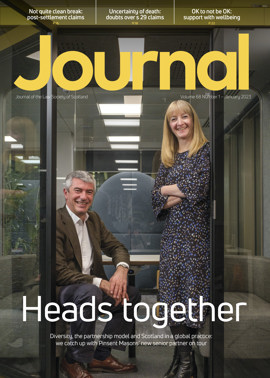Licensing: Keeping alcohol out of sight
The Scottish Government is consulting on proposals to restrict the advertising and promotion of alcohol, with the measures to be introduced as part of the current legislative programme.
According to the ministerial foreword, the catalysts for action are threefold: to prevent young people being exposed to alcohol marketing; to reduce “alcohol cues” that negatively impact on the alcohol-dependent; and “to prevent influence on social norms relating to consumption in general”.
Clampdown
The possible measures could scarcely be more wide ranging. They include the prohibition of alcohol sports sponsorship; a ban on outdoor alcohol advertising on vehicles, in public spaces and in print media produced in Scotland; and a prohibition on the sale of alcohol-branded merchandise, whether paid for or freely distributed (such as T-shirts, hats, jackets and baseball caps – “walking billboards”, according to the consultation). Curbs on television, radio and cinema advertising are likely. The measures may also embrace zero-alcohol products branded in the style of their alcoholic counterparts. Even more ambitiously, the Government is considering the restriction of paid online advertising. All that appears to be missing is a requirement for separate checkouts for alcohol purchases – although such a step cannot be completely ruled out.
For the licensed trade and its advisers, major challenges look certain to lie ahead. As matters stand, the Licensing (Scotland) Act 2005 imposes controls on the display of alcohol in the off-trade. It may only be displayed in a single public area approved by the licensing board and an area to which the public do not have access. The location of promotions is also circumscribed. Far wider restrictions are on the horizon. Window displays will now be excluded from a permitted area on the basis that “shop fronts are a source of marketing exposure for both children and young people as well as those in recovery”.
The prohibition of aisle-end displays is also under consideration, as is a measure reminiscent of tobacco controls, that would require alcohol displays located behind a checkout counter to be in “a closed cupboard”. The visibility of alcohol (a theme running through the whole consultation) may be addressed by “structural separation” to ensure that it is “near the back of the shop away from entrances, exits or checkouts”: perhaps a return to the “shop-within-a-shop” arrangement that was the norm in supermarkets until self-service started to become commonplace in the late 1980s.
Ireland introduced comprehensive placement restrictions in November 2020. However, although there has been no evaluation of their impact, the consultation appears to be heavily influenced by the Irish approach.
As to enforcement, the Government may work with existing regulatory bodies, noting that the new system would not be suited to supervision by local licensing standards officers, as marketing campaigns are often not associated with particular licensed premises. It is also possible that new regulatory arrangements may be put in place or a new regulatory body could be created in Scotland to monitor and enforce compliance.
Huge implications
Assuming that existing businesses will fall within the legislation, the practical and costs implications are considerable and look set to make a huge impact on the workload of licensing boards. The whole of the off-trade would require to obtain permission for the premises licence layout changes, save for possible exemptions in relation to small shops. (The consultation acknowledges that “further work will need to be undertaken on the impact to small retailers before any potential restrictions were introduced”.) That would involve the submission of licence variation applications supported by fresh layout drawings, as well as the expense of structural works. In many cases, the works are likely to result in a reduction in the capacity of alcohol displays and a smaller product range. One wonders how the curbs might affect specialist drinks retailers where the entire shop is given over to the display of alcohol.
In the sports arena, there are already predictions that a sponsorship ban could prevent the hosting of major football events, such as UEFA club competition finals, with wider consequences for Scottish clubs playing in European competitions sponsored by drinks companies.
Unsurprisingly, commentators have observed that the proposals mirror the wish list of anti-alcohol lobbyists and have compared attempts to airbursh alcohol from society with the zeal of the temperance movement, even predicting progress towards outright prohibition. What might lie ahead if, as appears, alcohol is set to become “the new tobacco”: plain packaging and health warnings on labels?
The consultation closes on 9 March 2023 and can be accessed on the publications section of the Scottish Government’s website.
Regulars
Perspectives
Features
Briefings
- Civil court: Costs – the tail that wags the dog
- Licensing: Keeping alcohol out of sight
- Planning: A framework for sustainability?
- Insolvency: When is a creditor not a creditor?
- Tax: A new, improved autumn statement?
- Immigration: First stop Rwanda?
- Scottish Solicitors' Discipline Tribunal: January 2023
- Civil court: Expenses – barred by delay?
- Property: Transparency, human rights and the registers






